Understanding Infected Pimple Scabs: Causes, Treatment, And Prevention
Dealing with an infected pimple scab can be more than just a cosmetic issue; it can also be a source of discomfort and concern. Many individuals experience this condition at some point in their lives, especially during periods of hormonal changes or skin irritations. When a pimple becomes infected, it not only leads to unsightly scabs but can also result in pain, swelling, and redness. Understanding the causes and remedies can help you effectively manage this skin problem and prevent future occurrences.
Infected pimple scabs can arise from various factors, including excessive picking, poor hygiene, or underlying skin conditions. Once a pimple is popped or irritated, bacteria can easily infiltrate the skin, leading to an infection that manifests as a scab. This scab forms as the body attempts to heal itself, but if not treated properly, it may worsen, leading to further complications such as scarring or the spread of infection. It’s crucial to recognize the signs of infection early to initiate appropriate care.
Moreover, the psychological impact of dealing with an infected pimple scab should not be overlooked. Many people feel self-conscious or embarrassed about their skin, which can hinder social interactions and affect their confidence. By arming yourself with knowledge about infected pimple scabs, you can take proactive steps to manage your skin health and improve your overall well-being.
What Causes Infected Pimple Scabs?
Understanding the root causes of infected pimple scabs is essential for effective treatment. Some common causes include:
- Picking or squeezing pimples
- Poor hygiene practices
- Use of non-comedogenic skincare products
- Underlying skin conditions like acne or rosacea
How Can You Identify an Infected Pimple Scab?
Identifying an infected pimple scab is crucial for timely intervention. Look out for the following signs:
- Redness and swelling surrounding the scab
- Pain or tenderness when touched
- Increased warmth in the affected area
- Pus or fluid leaking from the scab
- Fever or systemic symptoms in severe cases
What Are the Treatment Options for Infected Pimple Scabs?
Treating an infected pimple scab effectively involves several steps:
- Keep it Clean: Gently wash the affected area with mild soap and water.
- Apply Antiseptic: Use an over-the-counter antiseptic ointment to help prevent further infection.
- Avoid Picking: Resist the urge to pick at the scab, as this can introduce more bacteria.
- Consider Topical Treatments: Products containing benzoyl peroxide or salicylic acid can be helpful.
- Consult a Dermatologist: If the infection worsens or doesn’t improve, seek professional advice.
Can Infected Pimple Scabs Lead to Scarring?
Yes, infected pimple scabs can potentially lead to scarring if not treated properly. When the skin is compromised, the healing process can result in changes to skin texture and pigmentation. This is particularly true for individuals with darker skin tones, who may notice hyperpigmentation after healing.
What Preventive Measures Can Be Taken?
Taking steps to prevent infected pimple scabs is vital for maintaining healthy skin. Some effective measures include:
- Maintain good hygiene by washing your face regularly.
- Avoid touching your face to minimize the transfer of bacteria.
- Use non-comedogenic skincare products.
- Moisturize to maintain skin barrier integrity.
- Stay hydrated and eat a balanced diet for overall skin health.
When Should You See a Doctor for Infected Pimple Scabs?
If you experience severe symptoms, such as a high fever, widespread redness, or worsening pain, it’s essential to consult a healthcare professional. They can prescribe appropriate antibiotics or other medications to address infection and prevent complications.
Can Lifestyle Changes Help in Managing Infected Pimple Scabs?
Absolutely! Making certain lifestyle adjustments can significantly improve your skin health and reduce the risk of infected pimple scabs:
- Adopt a skincare routine that suits your skin type.
- Manage stress through relaxation techniques, such as yoga or meditation.
- Get adequate sleep to allow your skin to recover.
- Incorporate more fruits and vegetables into your diet for essential nutrients.
Personal Story: Overcoming Infected Pimple Scabs
Meet Sarah, a 28-year-old marketing executive who struggled with infected pimple scabs for years. Despite her busy lifestyle, she learned to prioritize her skin health. Here’s a brief overview of her journey:
| Detail | Information |
|---|---|
| Name | Sarah Thompson |
| Age | 28 |
| Occupation | Marketing Executive |
| Skin Type | Combination |
| Challenges | Frequent breakouts and infected pimple scabs |
| Solutions | Consistent skincare routine, professional treatment |
By understanding her skin and implementing a tailored skincare routine, Sarah was able to overcome her battle with infected pimple scabs. She shares her story to inspire others facing similar challenges.
In conclusion, infected pimple scabs can be a frustrating issue, but with the right knowledge and care, they can be effectively managed. By understanding the causes, treatment options, and preventive measures, you can take control of your skin health and boost your confidence. Remember to consult a healthcare professional if you have concerns about infected pimple scabs, and don't hesitate to seek support from others who have faced similar challenges.
Article Recommendations
- Leslie Charleson
- Paulina
- Is Bruno Mars Single
- Big Meech Wife
- Tyler James Williams Wife
- Sunday Rose Kidman Urban
- Bryce Adams Leaked
- Chip Gaines Heart Attack
- Camilla Araujo Nides
- Holly Madison Husband




